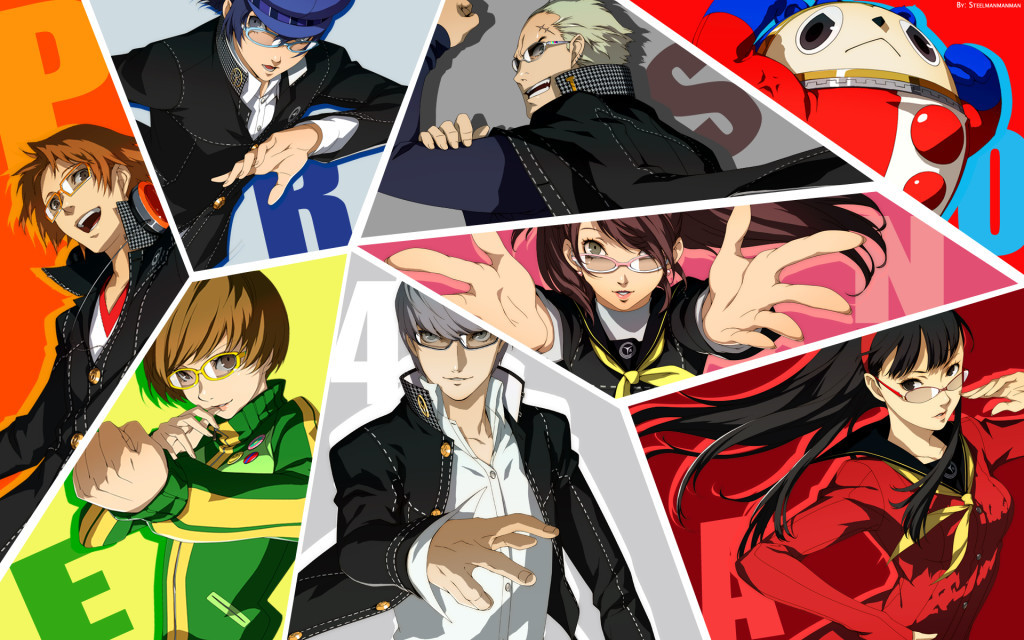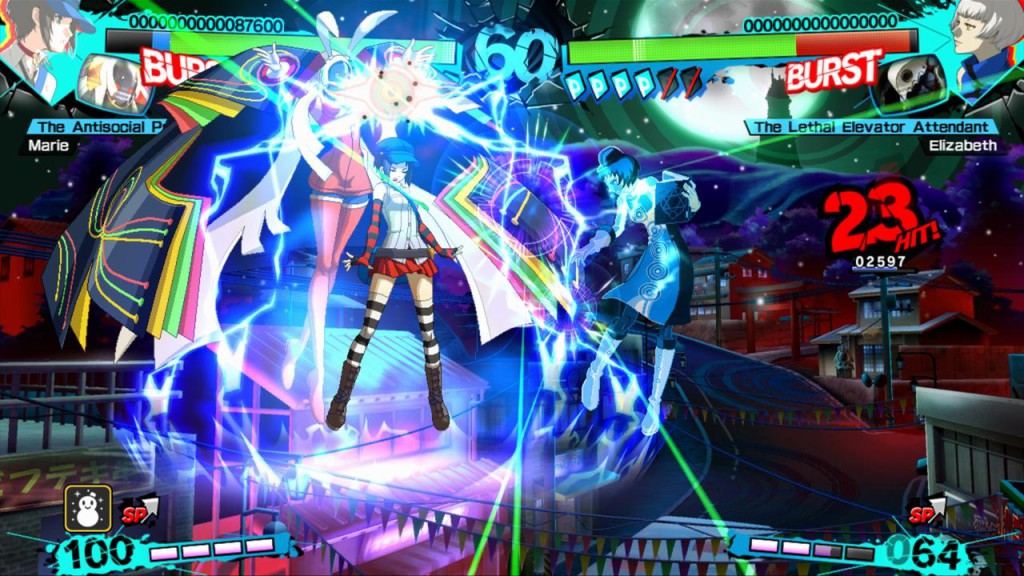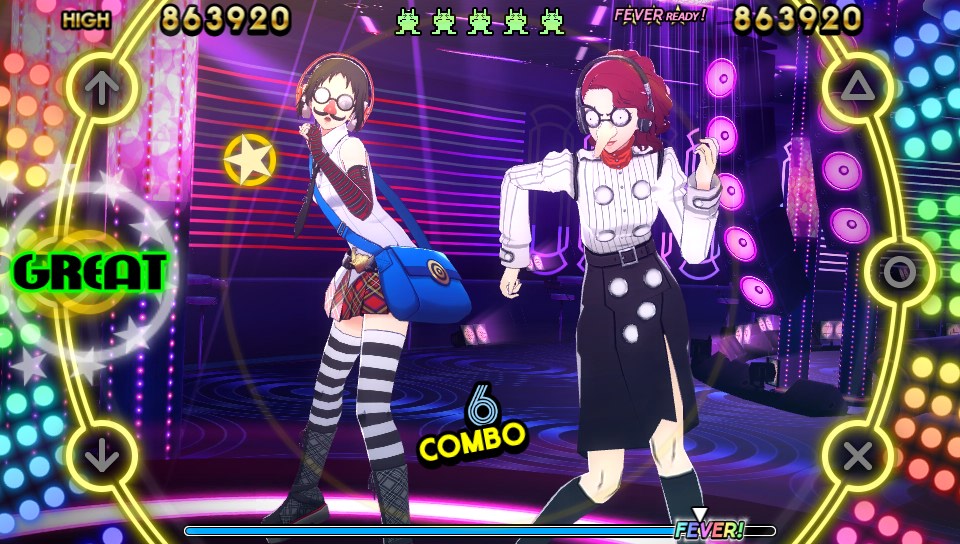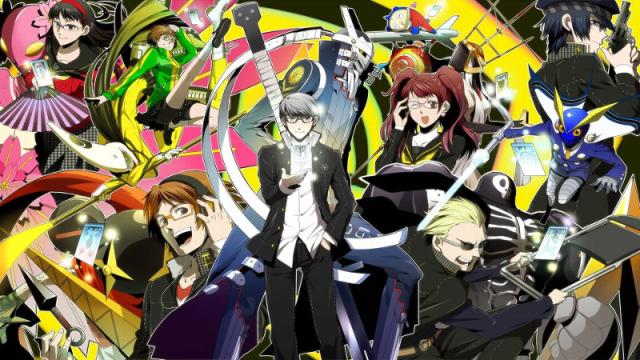How many games do you know that manage to combine Jungian psychology, Japanese school-life and urban legends? Just like me, the Persona series isn’t as popular in the West as Final Fantasy, but it’s been around just as long (since 1987), and is arguably much more interesting.
This post originally appeared on Kotaku UK on 4 April 2016.
Now the (too, too) long awaited Persona 5 is looming on the horizon, the first main game in Atlus’ series since 2008’s superlative Persona 4. Maybe you’ve seen one of the slick as hell trailers and want to jump aboard the hype train? We’ve got just the ticket.
Buckle in. The heritage of the series is confusing as hell, with multiple spin-offs, re-releases, alternate timelines and anime/films. The Persona games are technically a spin off from the larger Shin Megami Tensei (True Rebirth of The Goddess) series, itself borne from the original 1987 NES game Digital Devil Story: Megami Tensei. The game’s dungeon crawling and emphasis on mysticism, urban legends and demons based on folk mythology proved popular, putting developer Atlus on the map and paving the way for 17 main series sequels. The four most recent spin-off games span three platforms. The 3DS was home to old-school dungeon-crawler Persona Q: Shadow of the Labyrinth, 360/PS3 enjoyed a pair of fighting games (P4 Arena and it’s Ultimax sequel) so good they were included in EVO tournaments and the Vita was blessed with visual-novel-rhythm-game Dancing All Night.
So, why the fuss? What is it about Persona that people love?
The Personas Themselves
Simply put, a Persona is a manifestation of someone’s willpower and subconscious personality. You can collect them, craft them and level them up. Personas are modelled on a huge range of demon/god/spirit influences, ranging from cutesy designs like Jack Frost to the gruesome flying brain that is Omoikane. In battle they function as a ‘set’ of abilities and stats, and the whole system just fits into the fiction beautifully.
Social Links

Normally I play games to get away from my friends, but dammit, I love making new ones in Persona games. Maybe it’s something to do with the appeal of an idealised Japanese school life, where you always play as a strong but silent type who is popular and admired.
In each game, your ‘social links’ are hugely important. As you choose to spend time developing your relationship with a particular character, your ability to ‘fuse’ new Personas of their ‘Arcana’ grows stronger, which basically means you can use more powerful move sets in battle. What makes the system so loveable, though, is the way it ties together a ‘level up’ mechanic to actually learning more about the motivations, fears and hopes of your party members and NPCs.
There’s never time to max out your social links with everyone, so there’s a brilliant tension between levelling up your favourite arcana, and getting closer to your favourite characters. It also helps that Persona has great characters, from a wide-eyed blonde kid who lives in a bear costume to tongue-tied young reporters to an actual dog.
Them Feels
What shocked me most when I first played Persona 4 (my first game in the series) was just how deliberately Jungian it was. It’s hugely refreshing to see characters openly discussing their inner turmoil and admitting that it’s a part of them too, rather than struggling silently with the repressed elements of their personality. Hell, in Persona games, the characters even have fun with it.
This series isn’t afraid to discuss trauma, LGBT issues, loss, fear and depression. The way the characters explore it all is usually sensitively written, and it never feels cynical or gimmicky. The bosses in the game are physical versions of a character’s darkest emotions, set free by their inability to accept it as part of themselves. It’s way more interesting than the usual good vs evil trope.
Combat

The exact combat style differs throughout the series (in Arena, pictured above, it’s obviously completely different), but it’s always weird and wonderful. In the battle system of the Persona 2 duology you can negotiate or dance with your enemies (not saying Undertale ripped it off…) and 3 and 4’s is streamlined and colourful turn-based battling. In some ways Persona encourages grinding, but the actual battles are so fast it’s like Atlus doesn’t want you to get bored.
It’s also *gasp* actually quite accessible. You can even make your party members AI controlled. But if you want to go full nerd, there’s plenty of theorycrafting to be had perfecting the Persona fusion system.
Urban Legends
In Persona 2 (and sometimes on the internet), rumours have power. So much so that if they become popular enough, they become real. Your team can even manipulate this system, eventually causing all manner of bat-shit crazy legends to come to life. P3 (and Dancing All Night) instead focuses on one urban legend — the ‘apathy syndrome’ — and 4 kicks off with people appearing on an unsettling TV channel, viewable only on a rainy midnight.
Persona is about the pull and sway these legends and rumours hold over us, taken to their illogical conclusions. It infuses each game with an almost True Detective or urban horror vibe, and a crazy amount of gameplay possibilities. Each legend has some brilliantly thought out mechanics, and getting to the bottom of it all is awesome motivation that keeps you guessing well into the story.
The Music

Shoji Meguro is the man responsible for the sublime fusion of funk, jazz, hip-hop and instrumental hard-rock (dare I say metal?) that make up the Persona soundtracks. From the infuriatingly catchy Junes Department store jingle to the spine-chilling Midnight Channel theme, there are a lot of great, memorable tracks and motifs in the series. So many that perhaps Atlus had no choice but to build a rhythm-action game (Dancing All Night) around them.
Tl;dr
Persona games are about the unreal and the very real. They are a riot of colour, imagination, humour and humanity, chock-full of weird and cool mechanics and unforgettable characters. If you had to pick one game to play before Persona 5 to get yourself up to speed with the series, I’d suggest Persona 4 Golden. It’s the best in the series, and indeed one of the best JRPGs out there.


Comments
11 responses to “Why People Love Persona”
I hate to be that person, but Persona is part of the “Megami Tensei” series not the “Shin Megami Tensei” Series, Shin Megami Tensei, in and of itself is a spin off of the original Megami Tensei games, when P4 was published in western countries it was given the title of “Shin Megami Tensei: Persona 4” but that is thought of as a error by atlus.
It amuses me how riled up you are over this.
It’s not part of either series. Atlus added the Shin Megami Tensei bit but it’s not part of Megami Tensei either, it’s a spinoff. Japanese title of the first one was Megami Ibunroku Persona.
After years of hearing people rave about the Persona games, I was very excited about a year ago to buy Persona 3 on PS2 and finally sit down and immerse myself into this apparently incredible series…
I have to admit, about 3 or 4 hours into it, I gave up. I just don’t get it. The opening premise seemed interesting enough (the extra hour at midnight – cool concept) but I have this constant feeling that I’m playing the game wrong. When I try and fight monsters to grind for levels, the game tells me I shouldn’t fight for a few days because my characters are tired. When I just want to explore the school during the day and interact with everybody and everything, it tells me that I’ve run out of time and I need to be somewhere else. When I meet with one person after school, it means that I haven’t met with someone else. I have this constant feeling of failure, which I really dislike. Add to that the constant calendar reminders (How many days have I played this game WRONG, and how will that affect my character in the future??) and it’s just not a good time.
I may pick it up at another time (and perhaps Persona 4 and 5 fix a lot of these issues) but apart from the original setting, the game really did not grab me.
Persona 4 Golden fixed some of your issues, however; the game really doesn’t have a wrong or right way to play, each person’s experience is unique and personal and that’s a big part of the appeal
Persona 4 gets rids of the ability to be tired so you can explore and do a dungeon in one afternoon if you want
From what I recall of P3, you can fix being tired by taking a night off for sleep (rather than studying or whatever). The mechanism where you can only do one thing during each time slot is deliberate, as it forces you to pick between alternatives – and those alternatives are usually tied to particular social links, which in turn affect the levels of the Personas in each category.
You can’t do everything, and that’s a good thing; it forces you to choose and prioritise.
You don’t HAVE to max out every Social Link, and I’m pretty sure it’s not actually possible to do so on a first playthrough (may be possible in New Game Plus). It’s a different approach to the many RPGs where if things get tough you just grind out some levels – it’s a balancing act. I expect it drives minmaxers crazy. It adds an edge of tension.
That said, I do sympathise as I have a habit of grinding in RPGs to make the fights easier myself and find the inability to grind effectively frustrating sometimes.
Also, must be said: the original Persona was not actually all that great. The series didn’t start getting good until P2 – or even P3.
Tdlr, because they are type B weebos.
I think its more like ‘why people love Persona 4’ at this point. We haven’t had a proper new entry for eight years now. Soon.
3 & 4, really. The first two games are quite different. 3 is where it came together, especially with the music.
^ this one. If it wasn’t for 3, I would have thought the games mediocre and meh. But 3 hit it out the ballpark and then 4 was just a guilty pleasure.